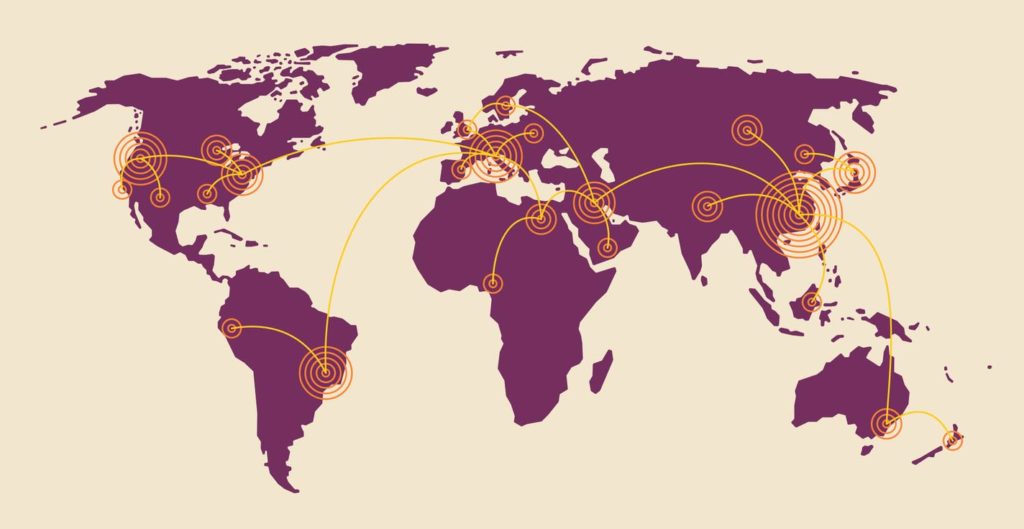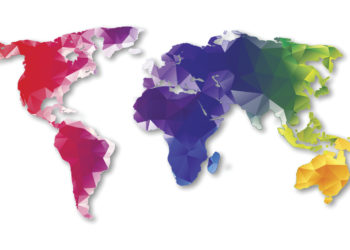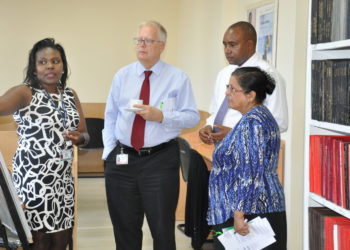Earlier this year, the Association of University Presses (AUPresses) launched a pilot program that seeks to deepen transnational dialogue and collaboration among mission-driven scholarly publishers.
The AUPresses Global Partner Program aims to connect the association’s member presses, both individually and as a community, with scholarly publishers in the “Global South,” for the purpose of mutually beneficial knowledge exchange. (“Global South” is used here to indicate the geographical areas of Africa, Asia, Latin America, and the Caribbean.) Association member and nonmember presses are matched for direct interaction, and the nonmember press staff are included in the association’s online discussion groups, webinars, and annual meetings and provided access to AUPresses’ online professional resources. The Association hopes that these collaborations not only will amplify the work of presses in the “Global South” but also expand the knowledge base of the university press community worldwide
During the program’s pilot year, African Minds from South Africa will partner with Duke University Press from the United States, and Makerere University Press from Uganda will partner with Liverpool University Press from the United Kingdom.
Here, the directors of the four inaugural partner presses—Anthony Cond, a member of the AUPresses Board of Directors and director of Liverpool University Press; Francois Van Schalkwyk, director of African Minds; Dean Smith, director of Duke University Press; and Sam Siminyu, director of Makerere University Press—along with AUPresses executive director Peter Berkery, answer questions about their early goals and expectations.

What factors contributed to the genesis of this program? How were the partner pairs identified/determined?
Berkery and Cond: Anthony proposed this idea as a member of our Board of Directors in 2019, motivated by the ad-hoc professional inquiries from nonmember university presses that he and other member press employees have received over the years. He invited the AUPresses leadership to think about new ways to further the association’s mission of ensuring academic excellence and cultivating knowledge as part of a global publishing community and to devise a realistic means of engagement with scholarly presses outside North America, Europe, and Australasia. With more than 150 members worldwide as well as a well-developed hub of professional resources—addressing common university press publishing challenges and sharing the best practices we’ve developed as a community—AUPresses is in an ideal position to facilitate this kind of resource-sharing, partner-based program. The Board enthusiastically agreed to the proposal.
As for seeking initial partners, we shared news of the program’s approval with Julio Paredes Castro, who directs Ediciones Uniandes in Bogotá, our only member press in South America, as well as Francois, with a request to circulate it among their networks. Coauthor of The African University Press (2017), Francois had peer-reviewed Anthony’s original proposal and was keen from the outset to be involved as a partner himself, and Sam at Makerere responded promptly to the invitation. To keep the program small and manageable in its pilot year, we opted to select member-partners from among the presses represented on our board. Sam selected Liverpool, and Francois chose Duke. As part of the pilot year, we look forward to thinking carefully about how this selection and matching process can be expanded and improved. Several member presses have already expressed interest in participating as future partners; similarly, we’ve received comparable expressions of interest from potential global partners.
What practical tips and considerations can you offer, at this early juncture, to other organizations that are looking to create similar programs?
Berkery and Cond: The following factors were important as we planned. The way our pilot year proceeds undoubtedly will suggest other considerations for future years:
- Start small, and use the pilot year actively to learn how a framework might be built to support the initiative at a greater scale.
- Expect and encourage 2-way exchange between partners.
- Recognize practical limitations in partner selection; for example, our pilot partners publish in and speak English as a common language. (We hope that member presses publishing in other languages will be able to engage nonmember partners in the future.)
- Engage established networks and experts in early peer-review of your program proposal; Francois and Julio both reviewed the proposal and helped us distribute the call for partners.
- Build and offer a diversified set of resources; in our case, those include not only introductions to partners and facilitation of partner relationships, but also access to a broad array of Association services: our rich library of online resources, discussion groups, and virtual collaboration space, as well as of course participation in our events programming.
- If you’re a membership-based association, include your membership department in early conversations about the best ways to share and value proprietary resources.
Often the most significant barrier to international collaboration is getting the resources to do it. What challenges, if any, have you had in funding this project? How do you plan to sustain its growth?
Berkery and Cond: That’s a critical question and the one for which we have the fewest answers. For our members, the main expense likely will be one of time, which as mission-based publishers they/we are always willing to invest. Our hope is that learning from our global partners about scholarly communities and markets that may be comparatively unfamiliar will help enrich both our practices and the wider scholarly ecosystem in non-financial ways.
As an association, our funding challenges at the moment are small since (due to the pandemic) we are not facilitating in-person meetings of the partner pairs and staffs, with attendant travel costs. But how we might tackle that in the post-pandemic future remains an unknown; this is one area for which we hope the pilot proves particularly instructive.
Because The Scholarly Kitchen’s audience is located primarily in the Global North, can you share some context/background about the African scholarly publishing scene and the opportunities/challenges you face as publishers there? Are there aspects of African scholarly communications about which you hope this program may help increase understanding in the Global North?
Van Schalkwyk: My research, with Therry Luescher, on university presses in Africa (Van Schalkwyk and Luescher, “The African University Press” report, August 2017) shows that there is a small but active group of university presses on the continent. In addition to the university presses, there is an emerging cadre of scholarly publishers in Africa that are, I think, more agile than the university presses because they are not subject to the institutional constraints and expectations that the university presses must contend with (Luescher and van Schalkwyk, “African university presses and the institutional logic of the knowledge commons,” Learned Publishing, September 2018). African Minds is one such press.
African Minds has been able to develop a relatively unique fully open access, not-for-profit publishing model for scholarly books. This means that we are not only free from these institutional dynamics but also from being dependent on a market economy driven by sales revenue and the accumulation of surplus.
We cannot, however, escape the reputation economy that rests on the scholarly communication system, as discussed in The Future of Scholarly Publishing: Open Access and the Economics of Digitisation (African Minds, 2017). This presents African Minds with the challenge of competing as a relatively new and small publisher with large, international publishers for the attention and regard of academic authors. It is particularly challenging for us to attract scholars in the early stages of their academic careers and who, along with the institutions that assess them, place more value in being published by large, well-known publishers.
A second challenge is to improve the visibility of our publications. Being fully open access means that our publications are accessible via the digital networks that define much of our daily lives. But we must still compete with large publishers and with myriad information sources to make our publications visible to our niche audiences both in Africa and abroad.
Siminyu: The African scholarly publishing scene is still very much dominated by international publishers with globalist agendas. As part of the colonial legacy, African educational institutions and individuals that utilize scholarly publishing services and products tend to have greater faith in these international publishers than in their local fledgling publishers. In this situation, whether the local scholarly publishers are private or affiliated with public institutions, they benefit greatly from associating with the better-established international scholarly publishers. African scholarly publishers can benefit from the reputation, mentorship, and accumulated experience of their often-older partners.
Be this as it may, the African scholarly publisher brings a special flavor to the publishing menu of the partner press. Partnerships can help convey African voices and local African concerns that otherwise would have gone unnoticed to the worldwide scholarly audience.
What are your expectations or goals for this partnership? Do you have any particular topics that you look forward to exploring?
Cond: From time to time I have heard an uncomfortable line of argument for open access that relies very much on a one-way vector in which readers in the Global South are in a passive, recipient role. It could be really valuable for us to understand counterflows whereby university presses in the Global North (and by extension our authors and readers) can learn as well. Both Liverpool and Duke have a strong international and transnational editorial outlook and our partners can deepen our understanding in this regard. Meanwhile, the discussion of our own practices is always an opportunity to think anew, refine, and improve—all the more so if questions are formulated from a different standpoint.
Siminyu: Given that Makerere University is striving to revive a press that had gone into limbo for about 15 years, we expect to learn from our partner press how to ensure that our investment will survive this time. What are those handles that enable the longevity of a venture of this kind? Since we are in the process of updating our policy, we hope to exchange views on the best possible policy formulations that will ensure sustainability.
Also, we started as a traditional, print-based publishing house. The times have since changed and now demand a shift to digital publishing. How can we navigate this transition within affordable options?
Smith: African Minds’ publishing model, featuring OA digital versions, relies on government subventions and is different than ours at Duke, but we share a similar mission: to offer “an innovative approach to those frustrated by a lack of support from traditional publishers.” We are attentive to our authors and believe that the experience we provide is not the norm.
I look forward to learning more about African Minds’ list, including The Future of Scholarly Publishing: Open Access and the Economics of Digitisation. I’m interested in driving global usage and discoverability of OA titles in general and want to make sure that African Mind titles can be found on multiple platforms. While their work is distributed worldwide through the African Books Collective, Francois has told me that African Minds sometimes struggles to get print copies of their books to readers in African countries because of limited print-on-demand equipment and lack of local support for repair and servicing, or unreliable mail delivery, so I’ve had some conversation with US POD providers on the press’s behalf as well. We’ve also discussed working on a joint publishing project as well as staff mentoring. My goal is to be of service to Francois and African Minds in any way I can.
Van Schalkwyk: I am hopeful that the AUPresses Global Partner Program will assist African Minds in tackling our challenges, mentioned above, of attracting young scholars and improving the visibility of our publications. Initial discussions with Dean and Duke University Press have been very encouraging in this regard. In particular, together we have started to explore copublishing ideas. Open access scholarly co-publications between African Minds and Duke University Press will not only provide our partnership and the program with a practical component to surface and test real-world challenges but will, I believe, yield benefits for both presses.
Are there particular challenges from the past pandemic year that you hope to explore/address with your partner press?
Siminyu: Before the COVID-19 pandemic, international collaboration entailed travel and physical contacts. We now will need to work out a process of collaborating remotely. This presents specific challenges and opportunities that we hope to explore and exploit. The lessons we learn could serve us in similar circumstances in the future.
During the pandemic, we also have noted that producers, distributors, and consumers of scholarly publications have had to rely more frequently on electronic channels. Given the considerable digital divide between the Global North and the Global South, this shift in emphasis comes with specific challenges; infrastructure deficiencies, requisite skills, and cost of access come to the fore. As we partner, we hope to explore and come up with mutually beneficial options.
Have you participated in cultural or professional exchanges in the past? If so, what perspectives might that experience add to the way you begin this program?
Siminyu: As an institution of higher learning that will celebrate its 100th anniversary in 2022, Makerere University is engaged in many international collaborations and partnerships with institutions from around the globe. We have had two-way student and staff exchanges; sandwich study, practicum, or internship program; and joint, multisite research projects, among others. As a publishing house, however, this is our very first major collaboration with a partner in the Global North. From our institutional experience, it is important that we find mutually beneficial activities that will buttress the commitment of both partners. We will need to focus on activities that increase our capacity to deliver on our global mandate as scholarly publishers.
Have you all identified any significant challenges to this project (for example, cross-cultural issues, resistance or slow buy-in, language barriers)? If so, what have you all done to help identify and prepare for these potential problems?
Cond: This is an early-stage pilot and not the first or last that strives to build these kinds of international connections. It will be crucial to embed regular time for formal and informal discussion and for both partners to zero in on key business issues beyond the cultural exchanges. As much goodwill as there is on both sides of the partnership, it will only work if there is structure and focus.
Siminyu: The most significant challenge we anticipate is technology-related. Since much of the work will be done using technology, there is a need for a seamless interface between the partners. However, the intermittent electricity supply in the localities where the staff of our university press live and work at home during this Covid-19 lockdown is already affecting the pace of work. Add to this the Internet shutdowns occasioned by political conflicts within Uganda and in the region, and you have a very fragile situation.
Oftentimes, during political contests like we have just been through as a country, external collaborations are viewed with suspicion, and this may influence commitment and uptake. With the elaborate checks to be done at every interface, approvals and endorsements may take a little longer.
Given that English is the official language and the language of education in Uganda from middle-primary school to university, the challenge of language in this collaboration is not major. However, Makerere University Press also publishes in local languages. Adapting publishing tools based on the English language for use in local language publications may pose a challenge.
Discussion
3 Thoughts on "The AUPresses Global Partner Program Begins: An Interview with the Partner Presses"
It is good to see the AUP engaged more with international publishing. For those of your readers who may not know, the Journal of Scholarly Publishing (on whose editorial advisory board I served from January 1993 through January 2020), especially beginning with the editorship of Ian Montagnes, did a great deal to shine light on scholarly presses overseas, and its back issues should remain a trove of good information on which this new effort can build. It does strike me as odd that African Minds would team up with Duke rather than Amherst College Press, which is the only AUP member press that operates fully on an OA model. When I served on the search committee for that press’s first director, I had to remind my colleagues, who were mostly librarians, that it was not enough just to post a title; marketing would still be required in order to succeed in an OA environment. I note that this is a challenge recognized by Francois in his remarks. His other challenge also resonates with me, as I had to deal with the reputational differences between Princeton and Penn State when I left the Ivy League press as editor-in-chief in 1989 to become director at Penn State. Attracting the best junior scholars was the biggest problem I faced because they knew their tenure committees would want them to publish with the best known presses. Eventually, I gave up trying to compete head to head with the most prestigious presses and concentrated instead on attracting already tenured scholars. One avenue to success, I found, both to enhance Penn State Press’s prestige and to solidify its future at the university, was to win book prizes, and over my 20 years as director we increased the number from a mere four inherited from previous directors to over 100 by the time I retired in 1989. That kind of prestige was even appreciated by faculty at Penn State in whose fields we had won prizes, as they found that candidates for positions in their departments were aware of the standing of the press in their fields and thus considered it a factor in their decisions to come to Penn State. That is a lesson that may prove useful to presses all over the world, whatever their model of publishing may be, traditional or OA. (I have a special interest in the latter model as author of the AUP Statement on Open Access, which I drafted when president of the organization in July 2007.)
Hi Sandy
I can’t comment on the process followed by AUPresses to set up the partnerships. What I do know is that we were presented with a list of interested publishers, and we selected Duke because they had a least some OA publications. We have had several meetings already and while you are right that our presses are on the opposite ends of the spectrum in many respects, the discussions have been very useful for us. Perhaps we sometimes learn more from those who dissimilar to us that from those who are similar?
Thank you also for the suggestion about book prizes as a mechanism for increasing a small publisher’s reputation. I have been toying with the idea of submitting more of our titles to the available prizes/competitions. I suppose I’m still grappling with the issue of whether we seek recognition from prize committees (even if this has reputational benefits if we are successful) or whether recognition from academics (in the form of downloads, citations, mentions, etc.) are more valuable. Perhaps I’m being too idealistic? Although a healthy dose of idealism got us to where we are today.
Certainly one can learn a lot from presses operating on different models. In our first OA experiment last Penn State, where the press and library jointly established the Office of Digital Scholarly Publishing in the spring of 2005, we drew heavily on the experience of The National Academies Press, which was the first to post its titles OA in the early 1990s. We tweaked its model a bit. NAP allowed for downloading of the entire book, but in a way that made the output look like bad newsprint. We mounted our books as PDFs but restricted downloading to half of the chapters so as to encourage POD sales. I have written about the ODSP here: https://scholarsphere.psu.edu/resources/508e16e9-fb58-4f9d-821d-21195008976d. (You’ll find a lot of other articles I wrote about OA at that site as well.)
About qualitative versus quantitative measures prizes versus downloads, citations, etc.), my guess would be that the former carry more weight in influencing an author’s decision about where to publish, partly because authors are more apt to know about prizes than about how many downloads, citations, etc. there have been, but there is nil reason one can’t go for both. Two axioms come to mind: nothing ventured, nothing gained; and the more the merrier. You might want to ask Amherst how it measures success for its OA books, and what they think works best in attracting new authors.
I do find it helpful as an author to see the “analytics” that the Penn State institutional repository provides for the 100 of my writings hosted at that site. (About 90% of them are about scholarly publishing issues including copyright.)



